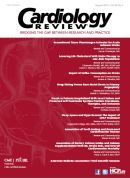Last Days of Summer

Debabrata Mukherjee, MD, MS, FACC
Editor-in-Chief
We are finally ready to move on from the scorching summer days to fall foliage splendor in many parts of our country. Many of us are also looking forward to the football season, and some of us are hoping that the Dallas Cowboys will do better this year. On a more serious note, I hope you are looking forward to this issue of Cardiology Review, which discusses many important articles and viewpoints that you will find quite useful.
Drs Chrisandra Shufelt and JoAnn Manson suggest that given a substantial risk reduction with statins in low-risk individuals, LDL-lowering guidelines in this population may need to be reconsidered. They state that over half of cardiovascular events occur in low-risk individuals with no previous history of vascular disease. Furthermore, it is difficult to argue with the dramatic reduction in vascular events with statin therapy in both primary and secondary prevention populations and the relatively small numbers needed to treat. Drs Shufelt and Manson go on to say that with anticipated updates in the National Cholesterol Education Program Adult Treatment Panel IV guidelines due to be released later this year, the prediction is that the LDL goal may in fact be lowered for primary prevention.
Dr Saurav Chatterjee discusses the benefit of early rt-PA therapy for acute ischemic stroke and reports that many eligible patients from subgroups excluded by the current drug labeling may benefit from rt-PA. Every stroke patient should, therefore, be evaluated as a candidate for thrombolysis, and patients should be treated as early as possible after acute ischemic stroke. Dr Mehdi Shishehbor discusses drug-eluting stents (DES) versus bare-metal stents in primary angioplasty, and suggests that current data do not support the routine use of DES for all patients undergoing primary PCI for STEMI. A personalized approach that accounts for patients’ age and
morbidity, compliance, and the risk of bleeding and stent thrombosis is most ideal.
Dr Harry Davis discusses associations of dietary calcium intake and calcium supplementation with MI, stroke risk, and overall cardiovascular mortality, and raises concerns about the risk of CAD with the use of calcium supplements. He astutely suggests that the routine use of these supplements in some patients may not be warranted—and could even be harmful—and we need additional data to accurately identify those at risk.
Dr Steven Borzak discusses the association of tooth scaling and cardiovascular disease, and notes that the safety and wisdom of routine oral care for the maintenance of teeth and gums is established as safe and effective with no concern for risk. Regular dental care appears prudent, even though uncertainty remains as to its contribution to vascular protection.
Dr Ragavendra Baliga discusses sleep apnea and hypertension and the impact of continuous positive airway pressure treatment. He suggests that given several unanswered questions, a large multicenter, randomized, controlled trial will be required, with particular attention not only to the quality of life but also to morbidity (including hypertension, pulmonary hypertension, atrial fibrillation, and heart failure) and mortality in this cohort.
Dr Sucheta Gosavi discusses heart failure with normal left ventricular ejection fraction and reiterates the need for development and evaluation of new treatment strategies for patients with this condition. Dr Jimena Blandon preaches moderation when it comes to our coffee addiction and recommends that the healthiest thing to do is to avoid extremes such as not drinking any coffee or having more than 5 to 6 cups/day. I am hoping she meant the “Trenta” size cup of coffee.
In our Resident’s section, Dr Karla Quevedo muses on cardiology training and quality of life, and quotes Voltaire; I particularly like the reference to cardiology being a noble profession, and possibly even divine! Also, the insightful compilation of major studies presented at the ADA meeting by our managing editor, Ms Jackie Syrop, should keep you updated on the latest happenings in this field. She discusses several key articles in the news—namely, early use of insulin, safety of insulin, and treatment of children with diabetes.
I hope that you will find these commentaries to be valuable and enjoyable. I encourage you to share your insights, thoughts, and personal experiences on the topics touched upon in this issue. I would love to hear feedback on how we can make this journal even better. My goal continues to be to have you looking forward to every print and online issue of Cardiology Review
